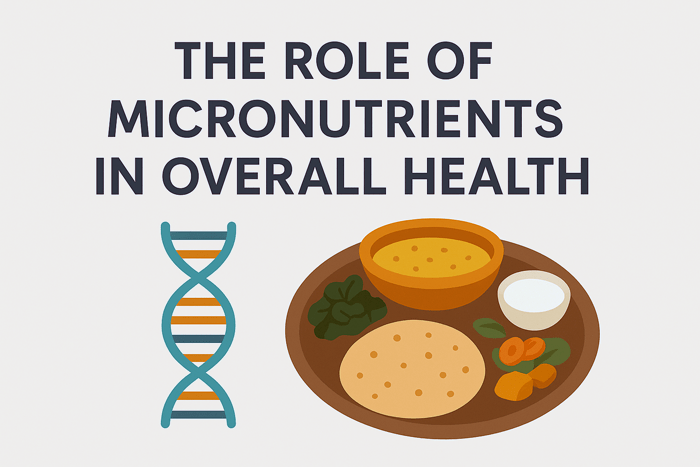The Role of Micronutrients in Overall Health
When we think about nutrition, our focus often goes straight to macronutrients — carbohydrates, proteins, and fats. While these are crucial for energy and bodily functions, there’s another group of nutrients that often works quietly behind the scenes, yet is essential for life: micronutrients.
Micronutrients, which include vitamins and minerals, are required in small amounts, but their impact on your health is massive. Without them, your body can’t produce hormones, enzymes, or other compounds necessary for growth, immunity, and daily function.
Ahmedabad-based Nutritionist Dr. Rushikesh Trivedi explains why micronutrients are important, the role they play in the body, and how to ensure you’re getting enough.
What Are Micronutrients?
Micronutrients are nutrients your body needs in tiny quantities but are vital for optimal health. They are divided into two main groups:
- Vitamins – Organic compounds that help regulate bodily processes.
- Minerals – Inorganic elements that support bone health, fluid balance, nerve function, and more.
Why Micronutrients Matter
Unlike macronutrients, micronutrients don’t provide calories, but they are crucial for:
- Strengthening the immune system
- Supporting healthy growth and development
- Preventing chronic diseases
- Enhancing energy production and metabolism
- Maintaining mental health and cognitive function
Even mild deficiencies can affect how your body performs daily tasks and fights off illness.
Key Micronutrients and Their Roles
1. Vitamin A
- Role: Supports vision, skin health, and immune function.
- Sources: Carrots, sweet potatoes, spinach, dairy products.
- Deficiency Risk: Night blindness, weakened immunity.
2. Vitamin C
- Role: Powerful antioxidant, aids collagen production, boosts immunity, helps absorb iron.
- Sources: Citrus fruits, bell peppers, strawberries, guava.
- Deficiency Risk: Weak immunity, slow wound healing, scurvy.
3. Vitamin D
- Role: Helps calcium absorption, strengthens bones, supports immunity.
- Sources: Sunlight exposure, fortified dairy, fish, egg yolks.
- Deficiency Risk: Weak bones, rickets in children, osteoporosis in adults.
4. Vitamin E
- Role: Antioxidant that protects cells from damage, supports skin health.
- Sources: Nuts, seeds, vegetable oils, green leafy vegetables.
- Deficiency Risk: Nerve and muscle damage, weakened immunity.
5. Vitamin K
- Role: Essential for blood clotting and bone health.
- Sources: Green leafy vegetables, broccoli, cabbage.
- Deficiency Risk: Excessive bleeding, weaker bones.
Important Minerals
1. Calcium
- Role: Builds strong bones and teeth, supports muscle function, nerve signaling.
- Sources: Milk, yogurt, cheese, leafy greens, fortified foods.
- Deficiency Risk: Brittle bones, osteoporosis.
2. Iron
- Role: Essential for hemoglobin production and oxygen transport in the blood.
- Sources: Red meat, poultry, lentils, spinach, fortified cereals.
- Deficiency Risk: Anemia, fatigue, weakness.
3. Magnesium
- Role: Supports muscle and nerve function, regulates blood pressure, aids in over 300 biochemical reactions.
- Sources: Nuts, seeds, whole grains, legumes, leafy greens.
- Deficiency Risk: Muscle cramps, irregular heartbeat, weakness.
4. Zinc
- Role: Supports immunity, wound healing, DNA synthesis, growth.
- Sources: Meat, shellfish, seeds, nuts, legumes.
- Deficiency Risk: Delayed wound healing, hair loss, frequent infections.
5. Potassium
- Role: Maintains fluid balance, supports nerve and muscle function, regulates blood pressure.
- Sources: Bananas, oranges, potatoes, tomatoes, spinach.
- Deficiency Risk: Weakness, muscle cramps, heart rhythm problems.
Signs You May Be Lacking Micronutrients
While severe deficiencies are less common today, mild deficiencies are widespread and often go unnoticed. Warning signs can include:
- Constant fatigue
- Frequent infections
- Poor wound healing
- Weak hair and nails
- Brittle bones
- Difficulty concentrating
How to Ensure Adequate Micronutrient Intake
- Eat a Balanced Diet – Include a variety of fruits, vegetables, whole grains, nuts, seeds, dairy, and lean proteins.
- Limit Processed Foods – These often lack essential micronutrients and are high in unhealthy fats and sugars.
- Check Your Levels – Blood tests can help identify deficiencies before they cause serious problems.
- Consider Supplements Carefully – Only take supplements when prescribed by a qualified nutritionist or doctor. Over-supplementation can be harmful.
- Focus on Absorption – Some vitamins (like A, D, E, K) are fat-soluble, meaning you need healthy fats in your diet for absorption.
The Ahmedabad Connection – Local Diet Challenges
In Ahmedabad and across India, many people face specific micronutrient deficiencies due to:
- Limited sun exposure (Vitamin D)
- Vegetarian diets lacking in iron and B12
- High reliance on polished grains with lower nutrient content
Dr. Rushikesh Trivedi often sees these patterns in patients and creates customized diet plans to bridge these gaps effectively.
Why Expert Guidance Helps
While general nutrition tips are helpful, your exact needs depend on your age, gender, health conditions, activity level, and lifestyle.
Dr. Rushikesh Trivedi, Ahmedabad’s trusted nutritionist, provides personalized nutrition plans that ensure you’re getting the right balance of micronutrients for your body’s needs. From managing deficiencies to boosting immunity and improving energy levels, his approach is both scientific and practical.
Take Control of Your Health Today
Micronutrients may be small in quantity, but they have a big role in your health. Don’t let deficiencies silently affect your well-being.
📞 Call: 099133 30931 to book your consultation with Dr. Rushikesh Trivedi and start your journey towards a healthier, more energized life.


